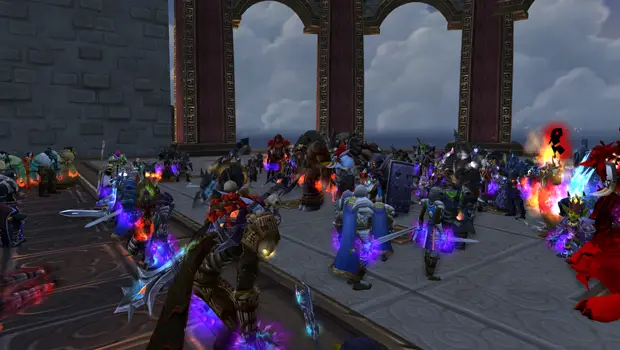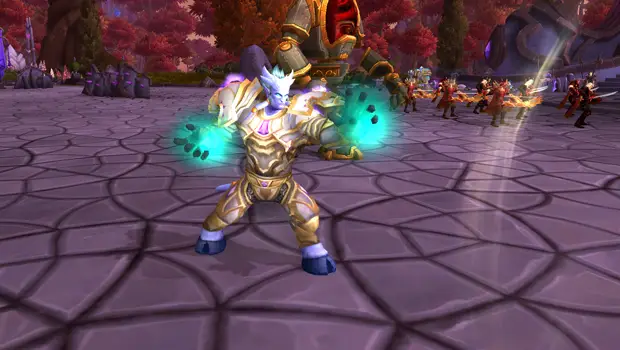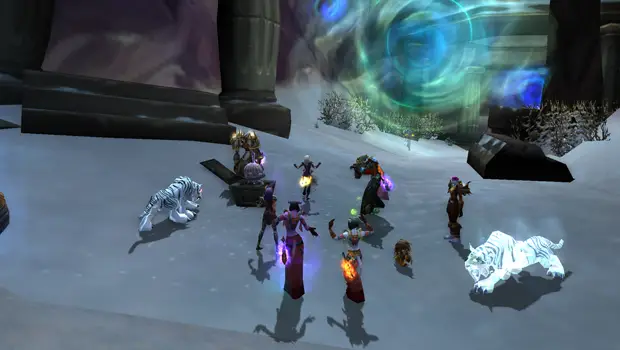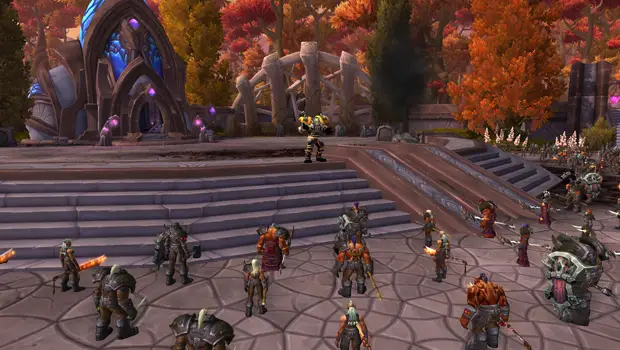Role Play: The three golden rules

I’m going to start this new column with a controversial statement: You can roleplay anything you want. Anything you want. You want to roleplay a half-demon, half-troll, who also happens to be the second cousin of Vol’jin? Go for it. You want to roleplay the leader of a nation or a kingdom that doesn’t exist? Go for it. You want to roleplay a warlock whose demons are less “enslaved,” more “gang of adventuring friends?” Go for it. Roleplay, at its core, is all about creativity, and the only limitations that exist are really the ones that lie in your mind.
But. (There’s always a but, isn’t there?)
This is one of three items that I like to call the golden rules for roleplaying, particularly when you’re roleplaying in a game whose lore has already been, at the very least, loosely defined. You can’t just take one of these three rules without keeping the other two in mind — all three have to work together in order to get that amazing roleplaying experience you’re looking for. This not only counts for World of Warcraft, this counts for pretty much any MMO you happen to be playing.
Rule #1: You can roleplay whatever you want.
Rule number one seems like a great rule in theory, and it is — you can roleplay anything your heart desires. I listed off a few pretty far-fetched examples earlier, but this goes for the not-so-far-fetched as well. For example: You have a human character, a blank slate. That blank slate human character in and of itself is pretty dull, so you decide to add a back story to that character in order to make them interesting. That back story can be whatever you’d like it to be — maybe they’re an orphan, raised on the streets of Stormwind. Maybe they’re from a small farm somewhere in the outskirts of Elwynn Forest. Maybe they are one of the last survivors of the kingdom of Alterac, forever embittered about what became of their beloved home. What you decide is entirely up to you.
Here’s what you want to consider, though: What you choose should probably, rule of thumb, at least reflect the world you’re roleplaying in, someone that could plausibly exist within that world. A hero from the American Revolutionary War wouldn’t really fit in Azeroth, as the war and all countries involved don’t actually exist on the weird little fantasy world of Azeroth. The cool thing about Azeroth, though, is that there is a lot, and I mean a lot of wiggle room to work with. Maybe a hero from the American Revolutionary War wouldn’t fit — but Azeroth has had several wars over the course of its history, and your character could be a hero from any of them.
World of Warcraft is pretty unique in that it spans such a large period of time that it simultaneously has a series of very well-defined historical events, and also has long stretches of time in which nothing is defined at all. So you’ve got a choice you can make here, logically speaking — you can choose to work with those defined historical events and use those as a backbone to root your character into the in-game world, or you can choose those points in which nothing at all has been defined, and make something up that sounds plausible and reasonable to you. One of these routes is far easier than the other, but the point of the matter is that neither of these options are wrong. And that’s when we move on to rule number two.
Rule #2: You can choose to roleplay with whomever you wish.
The nice part of roleplay is that it’s not a solo activity — it’s a round-table game of improvisational writing. Your character can certainly have adventures off on their own, and you can settle for simply writing about their deeds in various pieces of fan fiction for your own amusement, but there’s plenty of other adventures they could be potentially having that all hinge upon interacting with other roleplayers. Much like that question of who your character is, the question of what they’ve been up to is also entirely up to you — and sharing that information with others, finding out what they’ve been up to as well, is all part of what makes roleplay fun.
If you create a character with a back story, like the previously mentioned human who is one of the last survivors of the kingdom of Alterac, what happens if they run across another player that is also from Alterac? What do they decide to do together? Would they get along? Do they have different views on what happened? Will they fight? Will they be friends? You don’t know until you start talking to people.
But you can choose to roleplay with whomever you wish. If you see someone with a back story that doesn’t fit with your perceived idea of what’s going on in Azeroth, you don’t have to roleplay with them. You are under no moral obligation to speak to everyone you see in-character, you are under no obligation to acknowledge their existence. You have the freedom to pick and choose who you roleplay with, and if someone doesn’t fit your personal requirements for roleplaying, that’s fine. Just don’t roleplay with them. Move on, find someone else who does fit the criteria you’re looking for. That’s all there is to it, and there’s nothing wrong with making that choice. However, that also leads directly into rule number three, and it’s the most important rule of all.
Rule #3: Other players can choose whether or not to roleplay with you.
This is the important part, and it’s one that a lot of roleplayers tend to take very personally. Just as you can pick and choose who you’d like as roleplaying buddies, those same people are working under these same three golden rules. Just because you like that character story you’ve come up with, by no means does that mean anyone is under any obligation to roleplay with you. While you are looking at people’s stories and backgrounds and deciding whether or not they fit in with your personal view of what’s going on in Azeroth, they are doing exactly the same thing, to you. And there is nothing wrong, absolutely nothing wrong with making the choice not to roleplay with someone.
There are a whole world of different kinds of roleplayers out there — as I said, there are players that choose to use existing, established lore as a backbone for their story, and there are roleplayers that choose to sculpt their story out of the gaps and undefined moments in lore. And there are players that fall anywhere in between that spectrum as well. Each player is working with their own definition of what that world should be, their “headcanon” for how Azeroth should exist. For some people, defined lore is more important. For some people, it’s about the freedom to make their own definitions. And there is absolutely nothing wrong with any individual headcanon of how this stuff should exist.
But it doesn’t mean that people are obligated to roleplay with you. And the more outlandish and out of the box you make your character, the more you may limit the potential interactions you’re going to get as a roleplayer. The more far-fetched your idea, the less people you’re going to find that agree with it. So you have another question to answer and another choice to make, beyond “What kind of person do I want to make my character?” It’s “How many people, how much social interaction am I looking for with my roleplaying?” The larger that number, the wider the net you’re going to have to cast, and the more people your story is going to have to appeal to — which means you should probably start leaning more on defined, established lore, because those are the kinds of stories people are really familiar with, and willing to get involved with.
Everyone follows these rules.
Everyone follows these rules for roleplaying, whether they do it consciously or not. They aren’t really something most people think about as “rules.” People simply make their characters, fling them out in the world, and see where they fit in. Roleplaying guilds usually have existing storylines or “guild canon” that applicants need to fit the criteria for before they are allowed to join the guild, which means that players can deliberately choose to craft their stories to fit within the scope of that guild. Some guilds roleplay and do events with each other, if their stories seem to be following the same path of creative direction, and some guilds roleplay entirely within themselves, and don’t really acknowledge the existence of others. And there’s nothing wrong with any of that.
Far too often, the roleplaying community is one of not only excessive creativity, but excessive criticism and critique — because, for whatever reason, people that are making that choice about who they choose not to roleplay with are sometimes compelled to loudly define why they don’t want to roleplay with a person or a guild. In some cases, this is totally valid — obviously if there are roleplayers or guilds out there that harass or treat players poorly, a roleplayer should probably know about that before they inadvertently become one of the numbers of people who are treated poorly. A player or a guild with a strong negative force in the community is something that people should be wary of.
But there isn’t any logical reason why these critiques should be vocally made when the sum of that entire critique simply boils down to “I don’t like the world of let’s pretend that this particular person or people have made for themselves.” Why? Because you can simply choose not to roleplay with them. You don’t have to say anything — your silence will make your stance pretty clear. If someone asks for the reasons why you chose not to roleplay with them, or a critique of their character, feel free to share that information — but keep in mind that as much as you are free to choose who you do and don’t roleplay with, they are free to choose whether or not to take that critique under advisement. If they don’t ask for a critique, there is absolutely no reason why you should give one. It wasn’t asked for, it’s not needed.
Remember — roleplaying is at its heart a group effort and exercise in creativity. In that creativity is the freedom to make choices to suit your needs — and the freedom for others to make their own choices that suit their own needs. The less time you spend focusing on how one person’s character story is absolutely, utterly wrong in your eyes, the more time you can happily focus on making your character’s story the coolest thing you’ve ever written, and go out and have fun with it.
Please consider supporting our Patreon!
Join the Discussion
Blizzard Watch is a safe space for all readers. By leaving comments on this site you agree to follow our commenting and community guidelines.
 @Shadesogrey
@Shadesogrey






